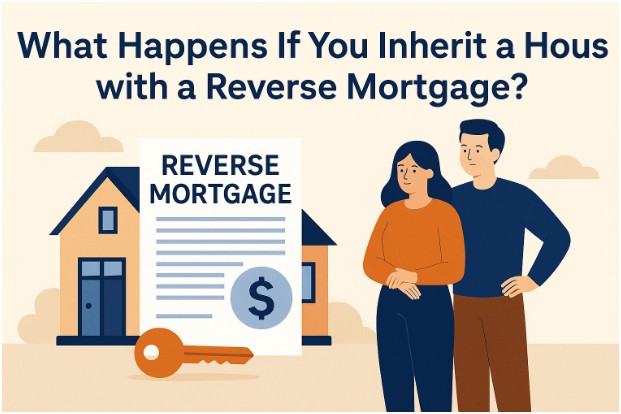If you inherit a house with a reverse mortgage, you face crucial decisions—and a deadline. Inheritance doesn’t erase the debt. Instead, the reverse mortgage becomes due and payable, and heirs must choose whether to keep, sell, or walk away. Below is a step-by-step guide to your options, timelines, and pitfalls, anchored in current HUD/CFPB rules.
Understanding the Reverse Mortgage After Death

How a Reverse Mortgage Matures (or “becomes due”)
A reverse mortgage matures when the last borrower (or eligible non-borrowing spouse) dies, permanently moves out, or fails to maintain residency. Once this maturity event occurs, the loan becomes due and payable.
At that point, heirs are on the clock. The servicer typically issues a Due & Payable notice and gives heirs an opportunity to respond.
Non-Recourse Protection & the 95% Rule
Reverse mortgages (especially HECMs) include a non-recourse feature: heirs or estates can’t be held responsible beyond the home’s value.
If the loan balance exceeds the home’s appraised value, heirs typically may pay 95% of the appraised value (rather than the full balance) to keep the property.
That “95% rule” ensures that heirs aren’t forced to cover a shortfall beyond what the home is worth.
Your Options as an Heir

Option 1: Keep the Home (Pay Off or Refinance)
If you want to keep the inherited home, you must pay off the reverse mortgage. That payoff is either:
- The full outstanding balance, or
- 95% of the current appraised value, whichever is less.
If you don’t have cash, you might refinance the reverse mortgage into a traditional forward mortgage.
Option 2: Sell the Home
You or the estate can sell the home, using the sale proceeds to pay off the reverse mortgage. Any surplus goes to the heirs.
If the home’s sale price doesn’t cover the mortgage, the non-recourse protection ensures heirs aren’t on the hook for the shortfall.
Option 3: Surrender / Walk Away
If maintaining or refinancing isn’t feasible, heirs can simply surrender the home (i.e. do nothing). The lender must foreclose through standard procedures—estate or heirs owe nothing beyond the home.
Even if heirs are on the title, they can walk away at no cost under the non-recourse terms.
Critical Timeline: Respond Quickly
Heirs don’t have unlimited time. Here’s the usual timeline:
| Stage | Deadline / Timeframe | Action Required |
| Due & Payable Notice | ~30 days after maturity event | Heirs must respond whether they intend to keep, sell, or surrender. |
| Settlement Period | ~6 months | Heirs must settle (pay off or sell). |
| Extensions | Two 90-day extensions possible (up to ~12 months total) | Extensions often granted in writing if requested early. |
If no response or action is taken, foreclosure may proceed.
It’s vital to communicate with the servicer early and request extension in writing so you don’t lose your options.
Special Case: Spouse Situations
Co-Borrowing Spouse
If your spouse was a co-borrower, they often retain the right to stay and continue payments under many reverse mortgage rules.
Eligible Non-Borrowing Spouse
A spouse who was not a co-borrower but qualifies under HUD’s rules (e.g. was married at origination, remained married, and lived in the home) may continue residing in the home.
Ineligible Spouses or Other Heirs
If you’re an ineligible spouse or a non-spousal heir, you must choose among the three options above (pay off, sell, or walk away).
Practical Steps for Heirs

- Obtain the most recent mortgage statement — Know the loan balance, servicing details, and insurer.
- Request an appraisal — To understand whether the home’s value is above or below the mortgage.
- Communicate your intentions to the servicer — Inform them if you intend to keep, sell, or surrender the property.
- Use extensions if needed — Apply in writing before the initial period expires.
- Transfer title (via probate or trust) — The servicer won’t deal with you until you prove legal ownership.
- Choose your path — Refinance, sell, or hand off the property. Don’t delay.
Frequently Asked Questions (Before Conclusion)
-
How long do heirs have to respond when they inherit a house with a reverse mortgage?
Heirs typically have about 30 days from notice to respond to the lender with their intention (sell, keep, or surrender).
-
What is the 95% rule in a reverse mortgage inheritance scenario?
If the reverse mortgage balance is more than the home’s appraised value, heirs may pay 95% of the appraised value (rather than the full balance) to retain the home.
-
Can I refinance the reverse mortgage after inheriting the home?
Yes — if you become the legal titleholder, you may refinance to a traditional mortgage and pay off the reverse mortgage.
-
What happens if heirs do nothing after inheriting a house with a reverse mortgage?
If heirs take no action, the lender may foreclose through legal proceedings. Heirs owe nothing beyond the property value, thanks to non-recourse protections.
The Takeaway: Don’t Delay Your Decision
Inheriting a house with a reverse mortgage means the clock starts ticking. The loan becomes due, and you need to decide whether to keep the property by paying it off (often at 95% of its appraised value), sell it and pocket the equity, or simply walk away without owing anything more. Acting quickly and communicating with the loan servicer is key to preserving all your options.
If you do decide to keep the property, this experience can even help you understand how to buy a house without a realtor — because handling the payoff, refinancing, and paperwork yourself teaches you a lot about the home-buying process.
The most important thing is to move forward with a clear plan and not let deadlines slip by. With the right knowledge and timely action, inheriting a home with a reverse mortgage doesn’t have to feel overwhelming — it can become an opportunity.










